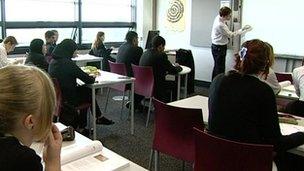Teachers react to tougher entry tests for trainees
- Published

Michael Gove says the "rigorous selection" of trainees is key to raising standards.
The government says entry tests for people wanting to become teachers will be more rigorous to raise the quality and standing of the profession.
Teacher trainees in England face tougher tests in English, mathematics and reasoning from next September.
Here teachers share their views on the planned changes.
Paul Hanson, head of English, Sellindge, Kent
As head of English at a very large secondary school in Kent, I welcome the desire to improve the core standards in literacy and numeracy of teachers.
Very often, students pick up bad practice from primary school and from non-specialist colleagues and this can undermine the efforts of those charged with developing students' skills in these areas.
However, by raising the bar at entry without improving pay and conditions, the government has woefully failed to understand how to encourage highly-skilled graduates into the profession.
Moreover, whilst these core skills are important, they are nowhere near as important as an individual's ability to engage and enthuse young people.
Frankly, it doesn't matter what subject knowledge expertise you have if the students are not listening to you.
Gwyn ap Harri, teacher in Doncaster
I'm sick of [Education Secretary] Michael Gove misusing the term rigour. I did the graduate teacher programme, and I found the entry exams ridiculously easy.
Yes, they should make them harder, but this doesn't make the selection process more rigorous.
What I found rigorous was the Qualified Teacher Status tests.
I had four massive folders full of cross-referenced evidence from observations and work I had done. Then I had to be observed and questioned a final time before being proudly awarded the QTS qualification.
I became a mentor for a Graduate Teacher Programme candidate and failed him because he plainly wasn't good enough - even though he had passed his exams.
The government allows free schools and academies to employ teachers without the QTS qualification, so how can they call the process rigorous?
Marc Neesam, teacher in London
As a teacher now in my fourth year I believe this policy should be welcomed. There needs to be a stricter level of standards expected of our teachers.
There needs to be a line drawn below which people are told they are not qualified enough to teach. This will save trouble in the long term.
If people want to teach and they have trouble with the tests, then they should either study to pass or they accept it isn't the career path for them.
Restricting the test to only two areas makes sense as it will stop student teachers 'learning the test' and scraping a pass.
Those who oppose this policy do not want to accept that as professionals in a front-line job dealing with children's education there is an expected academic standard before entering training.
Matthew Maw, teacher in Bristol
This is unbelievable. I trained as a teacher last year and I am now in my first post. I sat the English and maths tests.
Not only must all teachers have obtained a minimum C grade in both subjects at GCSE in order to obtain the prerequisite undergraduate degree, but we must also pass the numeracy test into which you are not allowed to take a calculator.
As a law graduate with a maths A-level, I can confirm the questions are fairly challenging, particularly as they involve mental arithmetic against the clock.
Why should a drama or history teacher need to prove themselves at an even higher level in a subject which they will not be teaching?
This will do nothing but exclude great artists, wordsmiths, athletes and others from the profession. I don't want mathematicians teaching history, I want historians!
- Published26 October 2012
- Published19 October 2012
- Published27 July 2012
- Published14 June 2012